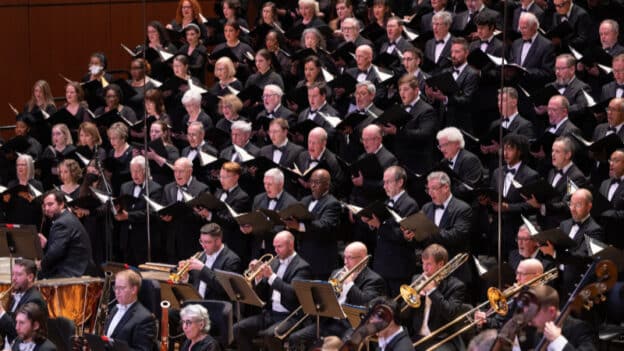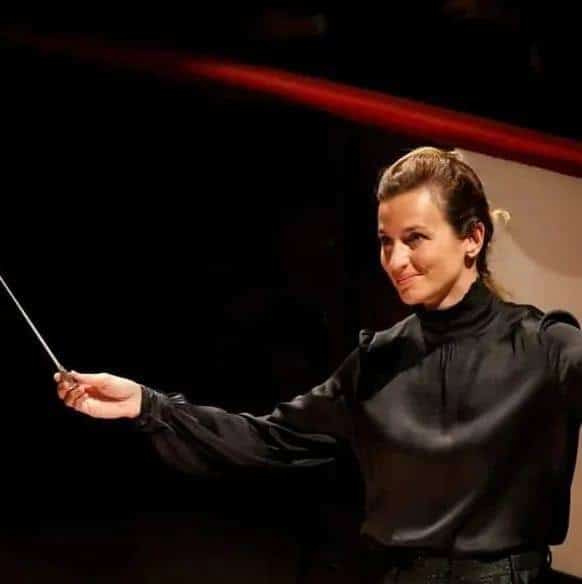Women in new music endure ‘masculinist perspectives’
Comment Of The DayReader’s Comment of the Day comes from William Osborne:
My wife Abbie and I have never participated in Europe’s new music world even though we have lived here for 42 years. Its cluelessly male orientation does not appeal to us. I think, for example, of media artist Stahl Stenslie’s statement in the program book of the 2000 Ars Electronica Festival that “even rape can be an art creational strategy.” Or I think of a talk given in 2017 at the Zentrum für Kunst and Media in Karlsruhe, one of Europe’s most important digital arts centers. Media theorist Norbert Bolz said women should not be allowed to work. It is an act of selfishness that harms families. He also noted that anyone can see that homosexuality is a disease that should be healed.
These are a couple of the more extreme examples, but they say something about a pervasive masculinist mindset which remains completely unacknowledged. Suffice it to say that this community which ironically sees itself as progressive and liberal has never been our cup of tea. And due to our activism for women in music, we became strongly resented and ostracized by it.
Happily, in the last few years there has been some slow movement toward more inclusivity for women. A tipping point will be reached. The curators and artists will eventually sense the new trend of “gender” and jump on the bandwagon.
It is difficult to explain why the new music world adheres to monolithic aesthetic and technical movements. Set practices like serialism or spectralism are established and become ruling paradigms. Artists must conform to the ruling trends while appearing avant-garde, almost as if they needed a TÜV certificate of appropriateness from Europe’s heavy cultural bureaucracies. (TÜV is an acronym in German which means „Technischer Überwachungsverein”. It is like UL, Underwriters Laboratories in the USA.)
The inclusion of women will continue to follow these same patterns. They are obligated to embrace the doctrines of the quasi-official avant-garde, the masculinist perspectives that we are conditioned to think of as being merely neutral. They will not be genuinely free, but part of a simulated equality in a tightly controlled and bureaucratic new music culture. As in the past, the effort will be to hollow women out and inhabit them while retaining only their face, a kind of window dressing that becomes something like being possessed by an alien force. Eventually, even the victims take this as perfectly normal.
The challenge of all artists is to circumvent these monolithic aesthetic ideologies, to stand apart and find authentic artistic identities. When women composers become about half of the new music world, and when they speak with their own voices, our world will be significantly changed.

composer Kaija Saariaho






Dear Mr Osoborn,
To put all of the above into a nutshell, you indulge (after all these) years in the logical fallacy that music by women composers sounds female, that of men composers, male.
All nonsense.
No one is trying “hollow women out” or “inhabit them while retaining only their face”. What would that even mean? What are you even talking about?
Comment of the day? For idiocy, perhaps.
But it happens sometimes.
In 2007 in Wales, three women were found who had been completely hollowed-out. In 2018 in South Poland, a woman has been discovered who was possessed by an evil spirit, while her face had remained the same as before. A tough exercise of exorcism drove the spirit out however, which the woman said afterwards, had saddened her considerably.
The image is aptly chosen. Does Kaija Saariaho feel that she is “part of a simulated equality in a tightly controlled and bureaucratic new music culture” and “a kind of window dressing that becomes something like being possessed by an alien force”, I wonder?
But of course, if she doesn’t feel like that, then she is a “victim” who takes it as “perfectly normal” and doesn’t “speak with her own voice”.
Sometimes I feel that the ‘victimised woman’ paradigm is taken too far.
Indeed: Kaija Saariaho has specifically commented that she is a composer. Period. Everything else – including her gender, or nationality – is secondary. She does not want to be labeled into some category by others.
Sometimes? Ya think?!!!!!! Where were they on the day of the Normandy landings?
New music is degenerate music anyway.
And the woman involved, are more than welcome to further that cause.
Is this sarcasm or should we understand what you wrote complaining literally. Can you further explain your statement? Can you explain your definition of “degenerate” or should that be taken literally? The last time the word “Degenerate”
was used on a large scale basis was by the Nazi’s who put that into “action.”
No, the word ‘degenerate’ doesn’t belong to the Nazis. It was around long before them (think Nero) and will be around long afterwards. I prefer the word “decadent” with its apposite tropes of rapidly accelerating downhill decay.
“They are obligated to embrace the doctrines of the quasi-official avant-garde, the masculinist perspectives that we are conditioned to think of as being merely neutral.”
Where is this actually happening? Who is shoving Joan Tower into a prescriptive box at gunpoint? Jennifer Higdon? Sally Beamish? Kaija Saariaho? Julia Wolfe?
They are not working in Germany.
The Anglo-Saxon world is a bit freeer, mainly because of the absence of the moral taboo – they were not occupied in WW II so Klangkunst is not a reaction against HItler as strong as in Germany.
I wish, then, that William Osborne had made it clear that he was talking about Germany. Europe and Germany are not coterminous (though some Germans might wish it were so …).
I think they all just really need to grow up.
I don’t listen to music by women as music written by women, or “women’s music”. I just hear music, good or bad. When I first heard Graznya Bacewicz’s third Symphony, I didn’t say “she’s great”, I thought “this is great!” So much whining goes on in defense of that which needs no defense. Shut up and write; shut up and listen. Some will say piggish things and if that’s all it takes to get one’s knickers in a bunch, this isn’t the business for you. Ignore and write on.
But people should say clearly that it’s written by a woman! Only in that way can we get some justice. You don’t have a BLM parade without blacks! Or a queer rally without queers! So we need it shouted from the roofs: WE can do it as well & better! (Like Olga)
Sally
Okay.
If women can write good, strong music, their gender is entirely irrelevant, because music does not have a gender.
Music can express aspects of the human condition in many different ways. Qualities which have become considered feminine can be written by any gender, as masculine qualities can.
All great music offers a broad range of emotional experience.
Beethoven was a quite masculine man but wrote many movements that seem to come straight from a tender woman’s heart.
Chopin was quite effeminate but wrote some of the most masculine and grand music ever imagined – and that only for the piano, without any help from trombones and timpani.
Debussy was something of a womanizer but as a character he seems to have been entirely feminine, and his music is very feminine with a core of classical masculinity, almost inaudible. Ravel had a mother complex and may have been someone who hid his gender preference in one of his exquisite cupboards, but wrote quite masculine classicist music with the superior hand of a general knowing exactly where to direct his troups.
Boulez, who…. etc. etc. – well, the point should be clear by now.
The irony of noting differences in music coded as masculine and feminine, and then asserting that they do not as a whole affect men and women composers.
Yes, life is full of ironies & paradoxes. Such terms are floating qualities, not labels.
PS
Maybe it should be called ‘musical gender fluidity’ and taken as an example for real-life situations, which would solve a lot of psycho problems and labelling conflicts.
“If women can write good, strong music, their gender is entirely irrelevant”
You *really* don’t see it?
“because music does not have a gender.” & “Chopin […] wrote some of the most masculine and grand music ever imagined”
Masculine music without gender. Okay.
I.e. gender unrelated to the composer’s gender.
“I.e. gender unrelated to the composer’s gender.”
Hmm. I’m not sure if I’d use gender at all to describe music, as it’s depending solely on (archaic) stereotypes.
“If women can write good, strong music, their gender is entirely irrelevant”
Rephrased: If women can write good, strong music, it doesn’t matter they are women.
That’s pretty pejorative and not what you wanted to say, I assume.
I don’t think that’s a correct translation, it’s a projection.
No serious listener listens to the gender of the music or of the composer. Music conveys human emotional experience, and the entire range of that palette includes all human affects.
“I don’t think that’s a correct translation, it’s a projection.”
Maybe it’s not the correct translation, but still a possible one. You said that gender is irrelevant if WOMEN… As if it’s kinda their choice. If you’d said: “If someone writes good music, who cares about their gender”, it would be less prone to being misinterpreted.
“No serious listener”
There’s the problem. 😉
“Music conveys human emotional experience, and the entire range of that palette includes all human affects.”
Can’t argue with that.
Sorry to correct you again, but you ask for it, in your linguistic confusion. Your paraphrasing “If someone writes good music, who cares about their gender”, is the same what I wrote.
That is what one gets with all these gender obsessions. It were much better to cancel the concept altogether.
“Sorry to correct you again”
No problem, you didn’t.
“in your linguistic confusion. Your paraphrasing “If someone writes good music, who cares about their gender”, is the same what I wrote.”
So, *someone* and *women* is now the same? But I’m the confused one, okay. You might want to check this out:
https://nl.wikipedia.org/wiki/Verzamelingenleer
If Men (M) and Women (W) are both non empty subsets of *Someone* (S) and M+W=S and you claim that S at the same time equals W, then M has to be identical to W. In other words: Men are women and v.v. I wouldn’t recommend basing a dissertation on this theory.
“That is what one gets with all these gender obsessions.”
Next time someone calls me out for being unprecise, I think I’ll just go the easy way and call him obsessed.
http://s3.amazonaws.com/pix.iemoji.com/images/emoji/apple/ios-12/256/woman-shrugging-medium-light-skin-tone.png
“It were much better to cancel the concept altogether.”
Would it be better? Or just easier for you and me?
Ph dear!
PS: Mr Osborne,
A friend of mine is a composer and has just finished a work that is formally a collage. It opens by quoting a YouTube video. The link is:
https://www.youtube.com/watch?v=1C-FKK0V5fw
Would this be the start of a work by a male or a female composer? If so, on what basis would you decide? Thank you for your attention.
Utterly tiresome, doctrinaire and grievance-fuelled comments.
Norbert Bolz is about as representative of the average German media intellectual as Matt Gaetz is (one hopes) of the average North American male, or Yehiya Sinwar, the Hamas leader, of the average Arab.
Norbert Bolz belongs to the Botho Strauss fringe of nasty “man wird wohl noch sagen dürfen” professional provocateurs whose stock in trade is to be invited to talks and talkshows as the ever reliable ‘réactionnaire de service’. Works like a charm: the bargain counter “Kulturkritik” reactionary aspiring to play, not quite successfully, the sub-sub-Heidegger.
Bringing him up as paradigmatic, then watering down the exhibit as an “extreme example”, while still introducing him as an exemplar of the alleged “pervasive masculinist mindset which remains completely unacknowledged” appears to me, to say the least, disingenuous. Or ill-informed, take your pick.
I usually read Mr. Osborne’s comments with much interest, especially when I disagree with them (which is quite often).
But today’s contribution baffles me: the customary slide into woke victimism, lately a regrettable hallmark of a number of Mr. Osborne’s comments, is projected against a background of complete ‘parquet deformation’, a kind of reality distortion which cannot be re-mapped by computing reference frame adjustments for known biases.
It’s completely off the map.
Some short notes about my reader’s comment:
1) There is, of course, a difference between a brief reader’s comment and a fully argued and formalized article.
2) Norman included a photo of Kiaja Saariaho which might give the impression I was talking about her. I was not. If anything, she is one of the best examples of how women do indeed successfully bring different perspectives to new music and even to continental modernism.
3) The ratio of European women who depart from mainstream European modernism seems to be much higher than for men, but for that reason and others, one seldom has an opportunity to hear their work. It is not necessarily better than the modernists, but notably different. If you are interested in these seemingly different voices, follow the work of the Internationale Arbeitskreis Frau und Musik and other similar organizations.
4) There are many problems inherent in “cultural feminism” –the idea that certain aesthetic values are preferred by women, and that those values must be reintegrated into society as a whole in order to bring a balanced gender identity to western culture. The greatest danger is essentialism. (Look the word up.) I discuss the problems with cultural feminism in an article about Pauline Oliveros entitled, “Sounding the Abyss of Otherness: Pauline Oliveros’ Deep Listening and the Sonic Mediations.” [Published as Chapter 3 in “Women Making Art” (New York: Lang, 2000) pp. 65-86.] Oliveros is another good example of how women seem to bring a different voice to new music and especially to modernism. You can read the article here:
http://www.osborne-conant.org/oliveros.htm
5) Forgive me if I do not debate these ideas in this forum.
The don’t raise them Mr Osborn if you are not open for debate. You could at least answer my question regarding a new composition, here:
https://www.youtube.com/watch?v=1C-FKK0V5fw
(see above)
1) That goes without saying.
2) Nobody thought you were talking about Kaija Saariaho. My assumption was that NL added the image as a wry comment on your apparently absolutist statements about the victimization of women in the New Music world. But since you raise the subject, can you define the “different perspectives” she brings to new music *as a woman* (rather than as an individual human being)?
3) I couldn’t quite make sense of your first sentence, but I’m not sure why a higher ratio would make it less likely for women’s work to be heard. Would I get a balanced view of the matter from the Internationale Arbeitskreis Frau und Musik? (I note the get-out words ‘seem’ and ‘seemingly’.)
4) “The greatest danger is essentialism.” I don’t think your article successfully avoids it. Too many historical over-simplifications and straw men, e.g. “Traditionally, we esteem men for what they accomplish in life, and women only by the nature of their being, such as their grace, charm and beauty.”
“(Look the word up.)” how patronizing!
5) Last-word-itis!